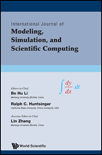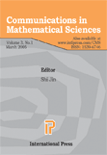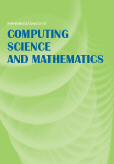
Mathematical Foundations of Computing
Scope & Guideline
Catalyzing Innovation in Artificial Intelligence and Beyond
Introduction
Aims and Scopes
- Mathematical Modelling and Analysis:
The journal emphasizes the development of mathematical models that can accurately represent complex systems in computing, including algorithms, network dynamics, and control systems. - Statistical Methods and Data Analysis:
There is a strong focus on statistical methodologies, particularly those that enhance predictive modeling and data interpretation, crucial in fields like machine learning and artificial intelligence. - Fuzzy Logic and Decision-Making:
Research on fuzzy logic is prominent, exploring its applications in decision-making processes, particularly under uncertainty, which is essential in various computing scenarios. - Approximation Theory and Functional Analysis:
The journal publishes work related to approximation techniques, including but not limited to polynomial approximation, which is vital for numerical methods and computational efficiency. - Control Theory and Systems Dynamics:
There is a consistent focus on control theory, particularly in the context of fuzzy systems and complex networks, highlighting the mathematical underpinnings of system stability and control. - Optimization Techniques:
The journal covers various optimization algorithms and their applications in real-world problems, which are crucial in enhancing computational efficiency and effectiveness.
Trending and Emerging
- Machine Learning and AI Applications:
A significant trend is the application of advanced mathematical techniques to machine learning and artificial intelligence, showcasing the intersection of these fields with statistical learning and algorithm optimization. - Complex Networks and Control Systems:
Research on control systems, particularly in the context of complex networks, is gaining traction, reflecting the increasing complexity of systems in computing and the need for sophisticated control methodologies. - Fuzzy and Neutrosophic Set Theory:
There is a growing interest in fuzzy and neutrosophic theories, particularly in their applications to decision-making processes under uncertainty, indicating a shift towards more nuanced approaches in mathematical modeling. - Fractional Calculus and Its Applications:
The emergence of fractional calculus as a tool for modeling complex systems in various fields, including physics and engineering, is becoming more prominent in recent publications. - Data-Driven Optimization Techniques:
Recent trends show an increase in studies focused on optimization techniques that leverage data-driven approaches, emphasizing the importance of real-time data in decision-making and system optimization.
Declining or Waning
- Traditional Deterministic Models:
There has been a noticeable decrease in papers focusing on purely deterministic models, possibly due to the growing interest in stochastic and probabilistic approaches that better handle uncertainty. - Elementary Statistical Methods:
The journal has seen a decline in the publication of basic statistical methods, as more advanced techniques and data-driven approaches take precedence in current research. - Basic Computational Geometry:
Research in basic computational geometry appears to be waning, potentially overshadowed by more complex applications and the integration of geometry with machine learning techniques.
Similar Journals

TWMS Journal of Pure and Applied Mathematics
Innovating Solutions through Rigorous ResearchWelcome to the TWMS Journal of Pure and Applied Mathematics, a distinguished publication dedicated to advancing the field of mathematics through rigorous research and innovative applications. Published by the esteemed Institute of Applied Mathematics, this journal provides a platform for scholars and practitioners alike to share their findings and insights in both pure and applied mathematical disciplines. With a commitment to quality and integrity, the journal seeks to enhance the visibility and impact of mathematical research, reflected in its scholarly output. Although currently not an Open Access journal, the TWMS Journal aims to feature high-impact articles that contribute to both theoretical understanding and practical implementation. The journal’s address is located at Baku State University, ensuring its roots in a vibrant academic environment in Azerbaijan. As an essential resource in the mathematics community, the TWMS Journal of Pure and Applied Mathematics invites contributions that push the boundaries of knowledge and foster dialogue among researchers, professionals, and students.

COMPUTATIONAL & APPLIED MATHEMATICS
Pioneering Insights in Computational and Applied MathematicsCOMPUTATIONAL & APPLIED MATHEMATICS, published by SPRINGER HEIDELBERG, serves as a premier platform for the dissemination of high-quality research and advancements in the fields of applied and computational mathematics. With an esteemed reputation bolstered by a Q2 ranking in both Applied Mathematics and Computational Mathematics categories, this journal delivers invaluable insights that cater to the scholarly community, including researchers, professionals, and students. It features rigorous peer-reviewed articles that cover a wide array of mathematical models, numerical algorithms, and their applications across various scientific and engineering domains. The journal has been in circulation since 2003 and remains relevant through its commitment to publishing cutting-edge research until 2024. Though not open access, its impact within the academic landscape is significant, with Scopus rankings placing it in the top quartiles of its fields. Whether you are seeking to stay updated on the latest findings or contribute your own work, COMPUTATIONAL & APPLIED MATHEMATICS is an essential resource for those committed to the advancement of mathematical sciences.

International Journal of Modeling Simulation and Scientific Computing
Connecting Theory and Practice in Modeling and SimulationThe International Journal of Modeling Simulation and Scientific Computing, published by WORLD SCIENTIFIC PUBL CO PTE LTD, is a pivotal resource in the realms of Computer Science Applications and Modeling and Simulation. With an ISSN of 1793-9623 and an E-ISSN of 1793-9615, this journal serves as a platform for innovative and high-quality research from 2010 to 2024, contributing to the advancement of methodologies and applications in various scientific fields. Although currently categorized in the Q4 quartile for both recognized domains and positioned in the 42nd and 36th percentiles in the Scopus rankings for Mathematics and Computer Science respectively, the journal encourages scholarly exchange and fosters the integration of modeling and computational analysis in scientific research. Researchers, professionals, and students alike will find this journal an essential tool to stay updated with trends, methodologies, and cutting-edge findings in simulation and computational techniques that drive scientific inquiry today.

FOUNDATIONS OF COMPUTATIONAL MATHEMATICS
Exploring the core principles of computational theory.Foundations of Computational Mathematics, published by Springer, is a premier journal dedicated to the advancement of research in the field of computational mathematics. With an impressive impact factor attributable to its rigorous peer-review process and high-quality publications, this journal is recognized globally, featuring in the prestigious Q1 quartile across various categories including Analysis, Applied Mathematics, Computational Mathematics, and Computational Theory and Mathematics. With a commitment to fostering innovative research, the journal welcomes original research articles, reviews, and notes that contribute to the theoretical foundations and practical applications of computational methods. Its Scopus rankings reflect its significant standing in the academic community, providing an essential platform for scholars, researchers, and students to disseminate their findings and engage with groundbreaking mathematical advances. For those seeking to stay at the forefront of the discipline, Foundations of Computational Mathematics offers invaluable insights and is a critical resource for fostering intellectual discourse and collaboration.

International Journal of Fuzzy Logic and Intelligent Systems
Transforming Ideas into Intelligent SolutionsInternational Journal of Fuzzy Logic and Intelligent Systems, ISSN: 1598-2645, is a prestigious journal published by the Korean Institute of Intelligent Systems, dedicated to advancing the fields of Artificial Intelligence, Computational Theory and Mathematics, Computer Science Applications, Logic, and Signal Processing. Established to foster interdisciplinary research, this journal has quickly established its reputation, reaching a respectable Q3 quartile ranking across multiple categories in 2023. It serves as a vital resource for researchers, professionals, and students, offering insights into cutting-edge methodologies and innovative applications of fuzzy logic and intelligent systems. With a focus on disseminating high-quality research, the journal attracts contributions that drive the evolution of intelligent technologies and their practical implications. Published from South Korea, the journal is positioned to impact the global community, facilitating a deeper understanding of intelligent systems in various domains.

Communications in Mathematical Sciences
Elevating Research Standards in Mathematical SciencesCommunications in Mathematical Sciences is a prestigious journal published by INT PRESS BOSTON, INC, dedicated to advancing the field of mathematical sciences through the dissemination of high-quality research. Since its inception in 2003, the journal has established itself as a key platform for scholars in both applied and theoretical mathematics, evidenced by its impressive rankings, with a Q2 designation in Applied Mathematics and a Q1 status in Miscellaneous Mathematics categories as of 2023. Although not an open-access journal, it provides comprehensive access to groundbreaking studies that span a wide array of topics within mathematical sciences, making it invaluable for researchers, professionals, and students alike. The journal's strong performance metrics, including a Scopus rank that places it in the 64th and 38th percentiles for General and Applied Mathematics, respectively, highlight its influence and significance within the academic community. With an optimistic convergence towards future advancements by 2024, Communications in Mathematical Sciences continues to play a vital role in the growth and evolution of mathematical inquiry.

Eurasian Journal of Mathematical and Computer Applications
Exploring New Horizons in Computational Mathematics and Modeling.Eurasian Journal of Mathematical and Computer Applications, published by the prestigious L N GUMILYOV EURASIAN NATIONAL UNIVERSITY in Kazakhstan, stands as a vital platform for researchers and professionals engaging in the fields of Applied Mathematics, Computational Mathematics, Computer Science Applications, Information Systems, Mathematical Physics, and Modeling and Simulation. With its ISSN 2306-6172 and E-ISSN 2308-9822, this academic journal aims to foster innovative research and facilitate knowledge transfer in these interdisciplinary domains. The journal, which converges its endeavors from 2013 to 2024, is currently ranked Q3 across its various categories in 2023, reflecting its growing influence and commitment to academic excellence. Despite its open access availability, the journal's dedication to quality research is evident as it attracts contributions that not only advance theoretical understanding but also address practical applications. With a supportive community of researchers in an increasingly important field, the Eurasian Journal of Mathematical and Computer Applications is poised to remain a significant resource for those seeking to propel the boundaries of mathematical and computational sciences.

International Journal of Mathematics and Computer Science
Pioneering Research in Mathematics and Computer ScienceThe International Journal of Mathematics and Computer Science (ISSN: 1814-0424, E-ISSN: 1814-0432), published by Lebanese University, serves as a vital platform for disseminating innovative research and advancements in the fields of mathematics and computer science. With a compelling range of topics including Algebra, Applied Mathematics, Computational Mathematics, and Statistical Analysis, this journal caters to a broad audience of researchers, professionals, and students. Spanning the years from 2017 to 2025, it has established a presence in several key quartiles, including Q3 rankings in Applied Mathematics and Computational Mathematics, and a Q4 ranking in Algebra and Number Theory. While currently not an open-access journal, it provides valuable insights through its rigorous peer-reviewed process, enhancing its relevance in both theoretical and applied domains. Furthermore, its presence in Scopus rankings reflects its commitment to quality, making it an essential resource for anyone looking to explore the intersection of mathematics and computer science.

Applied and Computational Mathematics
Transforming Ideas into Solutions: The Heart of Applied MathematicsApplied and Computational Mathematics is a premier journal dedicated to the dissemination of innovative research in the fields of applied mathematics and computational mathematics. Published by the MINISTRY COMMUNICATIONS & HIGH TECHNOLOGIES REPUBLIC AZERBAIJAN, this journal offers a prominent platform for scholars and practitioners worldwide, boasting an impressive Q1 category ranking in applied mathematics and Q2 in computational mathematics for 2023. With an excellent Scopus ranking placing it in the 96th percentile for both categories, it highlights the high quality and global impact of its published work. The journal spans a wide range of topics, ensuring it remains relevant to current and emerging trends in both theoretical and applied contexts. Access to its articles is streamlined through open channels, promoting collaboration and knowledge sharing among researchers. Applied and Computational Mathematics is pivotal for advancing the discipline and supporting the academic community's growth, making it an essential resource for researchers, professionals, and students alike.

International Journal of Computing Science and Mathematics
Exploring Innovative Solutions in Computing and MathematicsThe International Journal of Computing Science and Mathematics, published by INDERSCIENCE ENTERPRISES LTD, is a pivotal platform for the dissemination of cutting-edge research in the intertwined disciplines of computing science and mathematics. With an ISSN of 1752-5055 and an E-ISSN of 1752-5063, the journal primarily serves the academic community engaged in applied mathematics, computational mathematics, theoretical computer science, and more, making significant contributions that resonate across various fields of technology and science. While the journal is currently categorized in the Q4 quartile for multiple related fields, including Applied Mathematics and Computational Theory, it continues to strive towards advancing the knowledge and practice within these areas. Spanning years from 2007 to 2010 and again from 2012 to 2024, the journal seeks to publish high-quality, peer-reviewed articles that not only address theoretical advancements but also explore practical applications of computing science in mathematical contexts, thereby fostering collaboration among researchers, professionals, and students alike. Please note that this journal is not available as Open Access, thus ensuring a curated content selection intended for dedicated research communities.